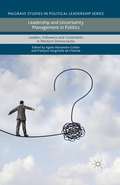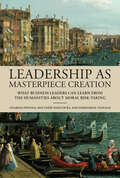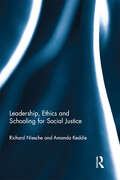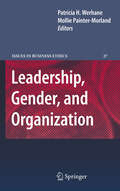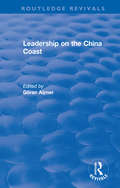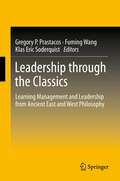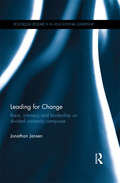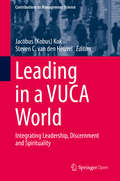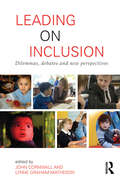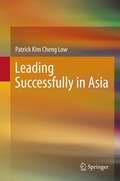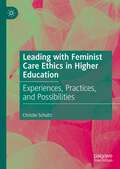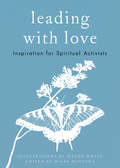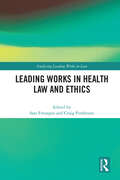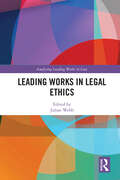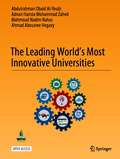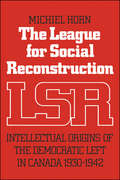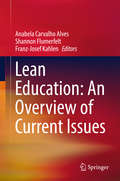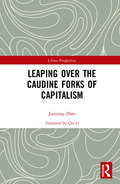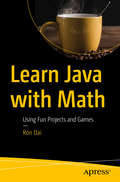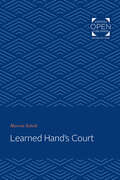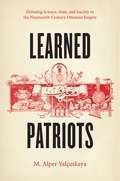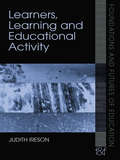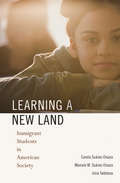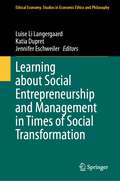- Table View
- List View
Leadership and Uncertainty Management in Politics: Leaders, Followers and Constraints in Western Democracies (Palgrave Studies in Political Leadership)
by François Vergniolle De ChantalThrough a range of international case studies from the USA, UK, France, Germany and Italy, this text assesses the conditions necessary for effective leadership and emphasizes the part played by uncertainty and division amongst followers.
Leadership as Masterpiece Creation: What Business Leaders Can Learn from the Humanities about Moral Risk-Taking
by Charles Spinosa Matthew Hancocks Haridimos TsoukasHow leaders can take the moral risks necessary to create &“masterpieces&”—admirable, distinctive, and high-achieving businesses that create meaningful lives for customers, employees, and themselves.In Leadership as Masterpiece Creation, Charles Spinosa, Matthew Hancocks, and Haridimos Tsoukas show how the humanities can help leaders create profitable, masterpiece organizations. Such organizations, they assert, are ones that possess the emotional and moral sensibilities of an artist, the wisdom of a statesperson, and the technical know-how of commerce. The authors draw on the works of Nietzsche, Heidegger, Bernard Williams, Shakespeare, and Machiavelli to conceptualize moral risk-taking, and then on the actions of Churchill, Madam C. J. Walker, Anita Roddick, Jeff Bezos, and others to show how the humanities can help create admirable businesses today.As management consultants and educators steeped in the humanities themselves, the authors discuss their experiences helping business leaders achieve successful masterpieces that bring good lives to many. After describing our contemporary business environment and examples of leaders who have created masterpiece organizations, the book turns to the basic skills of masterpiece creation: managing moods, building trust, listening for difference, and speaking truth to power. Then come the senior skills: moral risk-taking and creating a masterpiece organizational culture, strategy, and leadership style. Last, the authors explain why their leaders build an economy of gratitude.A culturally ambitious and refreshing read, Leadership as Masterpiece Creation is an invaluable volume for leaders of every stripe who wish to act daily with moral imagination.
Leadership, Ethics and Schooling for Social Justice
by Richard Niesche Amanda KeddieIssues of social justice and equity in the field of educational leadership have become more salient in recent years. The unprecedented diversity, uncertainty and rapid social change of the contemporary global era are generating new and unfamiliar equity questions and challenges for schools and their leaders. In order to understand the moral and ethical complexity of work undertaken in the name of social justice and equity in diverse contexts, this book uses a range of different theoretical tools from the work of Michel Foucault. Rather than a prescriptive, best practice approach to leadership and social justice, this book draws on Foucault’s four-fold ethical framework, and specifically, the notions of advocacy, truth-telling and counter-conduct to critically examine the leadership work undertaken in case studies in schools in Australia and England. Our approach makes transparent the ethical work that leaders in these contexts conduct on themselves towards creating schools that can address the equity challenges of the present climate. It illuminates and enables critical analysis of the moral imperatives shaping the equity work of school leaders and, in particular, the possibilities for transformative leadership that can work to create schools and school systems that are more socially just. Overall, the book’s key aims are to: Provide an innovative and comprehensive theorising of leadership for social justice in contemporary times; Explicate the utility of key elements of Foucault’s theorising of the ethical self to the domain of educational leadership; and Provide significant practical insight into the social justice possibilities of school leadership in contemporary times through two in depth case studies
Leadership, Gender, and Organization
by Mollie Painter-Morland Patricia WerhaneThis text provides perspectives on the way in which gender plays a role in leadership dynamics and ethics within organizations. It seeks to offer new theoretical models for thinking about leadership and organizational influence. Most studies of women's leadership draw on an ethics of care as characteristic of the way women lead, but as such, it tends towards essentialist gender stereotypes and does little to explain the complex systemic variables that influence the functioning of women within organizations. This book moves beyond the canon in exploring alternative paradigms for thinking about leadership and gender in organizations. The authors draw on the literature available in systems thinking, systemic leadership, and gender theory to offer alternative perspectives for thinking about the ways women lead. The book offers invaluable theoretical perspectives and insightful narratives to graduate students and researchers who are interested in women's leadership, gender and organization. It will be of interest to all women in leadership positions, but specifically to those interested in understanding the systemic nature of leadership and their role within it.
Leadership on the China Coast (Routledge Revivals)
by Göran AijmerOriginally published in 1984, Leadership on the China Coast brings together four independent empirical studies of leadership exercised on China’s southern coastland. Written by academics from across several disciplines, the book presents a wealth of research on methods of constructing authority in China, and on informal politics as a process integrated with formal bureaucratic administrations in which idiosyncratic leadership operates on all levels under shared ideological and legal constraints. Leadership on the China Coast will appeal to those with an interest in the social and political history of China.
Leadership through the Classics: Learning Management and Leadership from Ancient East and West Philosophy
by Gregory P Prastacos Klas Eric Soderquist Fuming WangThe unforeseeably complex socio-economic and environmental challenges of the 21st century must be tackled by placing faith in the power of mankind to integrate established wisdom and new knowledge, and in our ability to collaborate for a sustainable future. Departing from this, a global 2011 conference debating papers devoted to the impact of ancient philosophy, focusing on Confucius and Aristotle, in modern leadership and management was organized by Hanban, the Athens University of Economics & Business, and the University of International Economics & Business, Beijing, China. A rich sourcebook for a broad audience, this unique volume presents the wide array of conference contributions by international thought-leaders. Departing from a foundation of general concepts of ethics and leadership the book then delves into questions about how philosophy shape emerging economic and business systems, to end with direct lessons from ancient philosophy for contemporary business challenges.
Leading for Change: Race, intimacy and leadership on divided university campuses (Routledge Research in Educational Leadership)
by Jonathan JansenThis book offers new theoretical ground for thinking about, and transforming, leadership and higher education worldwide. Through an examination of the construct of intimacy and ‘nearness’, including emotional, spiritual, psychic, intellectual, and physical closeness, Jonathan Jansen demonstrates its power to influence positive leadership in young people. He argues that sensory leadership, which includes but extends beyond the power of touch, represents a fresh and effective approach to progressive transformation of long divided institutions. Considering richly textured narratives, chapters explore complex intimacies among Black and White university students in South Africa, post-apartheid and in the aftermath of a major racial atrocity. The stories reveal the students’ transformation in the process of ‘leadership for change’, interweaving concepts of racism, human relationships and intimacy, and in turn expanding the knowledge base of social and institutional improvement. This book explores how, when different kinds of nearness come together in leadership change, young people respond in ways that would not be possible through conventional instruments such as policy, legislation and the appeal to moral sensibilities alone. Leading for Change will be critical reading for academics, researchers and postgraduate students in the fields of education, educational justice, higher education, educational leadership and change, social and/or racial justice. This book will also be of interest to those working in the fields of anthropology, social psychology, and South African contemporary politics, policy and institutional practices.
Leading in a VUCA World: Integrating Leadership, Discernment and Spirituality (Contributions to Management Science)
by Jacobus Kobus Kok Steven C. van den HeuvelThis open access book brings together works by specialists from different disciplines and continents to reflect on the nexus between leadership, spirituality and discernment, particularly with regard to a world that is increasingly volatile, uncertain, complex, and ambiguous (VUCA). The book spells out, first of all, what our VUCA world entails, and how it affects businesses, organizations, and societies as a whole. Secondly, the book develops new perspectives on the processes of leadership, spirituality, and discernment, particularly in this VUCA context. These perspectives are interdisciplinary in nature, and are informed by e.g. management studies, leadership theory, philosophy, and theology.
Leading on Inclusion: Dilemmas, debates and new perspectives
by Lynne Graham-Matheson John CornwallLeading on Inclusion: Dilemmas, debates and new perspectives critically examines the current theory and legislative context of special educational needs and disability, and explores the enduring issues and opportunities that will affect future practice in all schools. The central theme throughout the book asks the inevitable question ‘What happens next?’ and the expert team of contributors, drawn from a pool of teachers, academics and researchers, consider wide-ranging issues such as: the voice of young people whole school development and planning for inclusion educational change within the context of inclusion the pros and cons of multi-professional working inclusive and ethical research international perspectives on inclusion, SEN and disability the development of teacher education and the notion of ‘joined up’ thinking. This forward-thinking and rigorously researched book will be essential reading for students, teachers undertaking school-based training, SENCOs, inclusion managers, higher education tutors and anyone with a professional interest in the future for inclusive education.
Leading Successfully in Asia
by Patrick Kim LowThe book captures the essence of leadership, its characteristics and ways in Asia through the cultural and philosophical visor. With Asian sayings, proverbs and quotes, the book discusses leadership issues and ways in the major Asian countries including China, India, Indonesia, Japan, Malaysia and Singapore. The leadership styles and ways of various great Asian national leaders and corporate leaders in these Asian countries are also examined. Perhaps of much interest to scholars and students of leadership, certain unique Asian features such as Buddhism, Confucianism, Ta Mo, Chinese Animal zodiac signs, Hindu Gods, the Samurai, the Spirit of Bushido and Zen are examined in the light of leadership mastery and excellence. The book is also intended to be a practical book that gives numerous examples of a potpourri of leadership skills and ways a person needs to be a leader. It is very action-orientated, the reader is urged to think about it, reflect and act.
Leading Successfully in Asia
by Patrick Kim LowThe book captures the essence of leadership, its characteristics and ways in Asia through the cultural and philosophical visor. With Asian sayings, proverbs and quotes, the book discusses leadership issues and ways in the major Asian countries including China, India, Indonesia, Japan, Malaysia and Singapore. The leadership styles and ways of various great Asian national leaders and corporate leaders in these Asian countries are also examined. Perhaps of much interest to scholars and students of leadership, certain unique Asian features such as Buddhism, Confucianism, Ta Mo, Chinese Animal zodiac signs, Hindu Gods, the Samurai, the Spirit of Bushido and Zen are examined in the light of leadership mastery and excellence. The book is also intended to be a practical book that gives numerous examples of a potpourri of leadership skills and ways a person needs to be a leader. It is very action-orientated, the reader is urged to think about it, reflect and act.
Leading with Feminist Care Ethics in Higher Education: Experiences, Practices, and Possibilities
by Christie SchultzThis book explores how academic leaders throughout higher education experience and practice care and the ethics of care. Drawing on a narrative inquiry study of experiences and practices of feminist care ethics in higher education leadership, Schultz counters academic norms, including expectations of competition and criticism across all activities, by uncovering the common experiences of academic leaders who intentionally adopt practices guided by an ethics of care and relationality. Within the context of institutions of higher education responding to present-day social movements, the book highlights how practices of care-centered leadership can enable change that begins on campus and reaches outwards to positively impact the community.
Leading with Love: Inspiration for Spiritual Activists
by Hisae Matsuda Maude WhiteWhen the world is burning with anger, divisiveness, and fear, this book of inspiring quotes selected by the editors of Parallax Press is a still, small voice in the storm that will bring peace of mind to the reader. With delicate illustrations by artist Maude White, this book speaks to the vulnerability and courage of holding space for the loving, connected, and more beautiful world our hearts know is possible.This book is gift, solace, and inspiration for idealists, progressives, and anyone fighting the good fight. In the long tradition of spiritual activists from Martin Luther King Jr and Thich Nhat Hanh to new and less known voices, this book of 100 quotes draws from a range of contemplative traditions and offers wisdom and nourishment for anyone engaged in working for a more compassionate world. Quotes include those by Thich Nhat Hanh, Sister Chan Khong, Joanna Macy, Sulak Sivaraksa, and others, on themes of awareness, idealism, kindness, self-compassion, truth-telling, transformation, resilience, and love.
Leading Works in Health Law and Ethics (Analysing Leading Works in Law)
by Sara Fovargue Craig PurshouseHealth and healthcare are vitally important to all of us, and academic interest in the law regulating health has, over the last 50 years, become an important field of academic study. An analysis of the development of, changes in, and scope of health law and ethics to date, is both timely and of interest to students and scholars alike, along with an exploration of its likely future development. This work brings together contributions from leading and emerging scholars in the field. Each contributor has been invited to select and analyse a ‘leading work’, which has for them shed light on the way that health law and ethics has developed. The chapters are both autobiographical, reflecting upon the works that have proved significant to contributors, and also critical analyses of the current state of the field. This collection also includes a specially written Introduction and Conclusion, which critically reflect upon the development of health law and ethics and its likely future developments in the light of the reflections by contributors on their chosen leading works. The book will be of interest to students, teachers, and researchers in health law and ethics, as it provides critical discussions and assessments of some of the leading scholarship in the field.
Leading Works in Legal Ethics (Analysing Leading Works in Law)
by Julian WebbThis volume reviews and takes stock of legal ethics, at a time when the legal profession globally is experiencing considerable change and challenges, through a re-evaluation of writings that are in some way foundational to the field. Legal ethics, understood here as the study of the ethics and professional regulation of lawyers, has emerged as a novel and important field of study over the last 50 years. It is also one that displays considerable diversity in its scholarship, with distinctive philosophical and interdisciplinary approaches emerging over the years to underpin and supplement the doctrinal ‘law on lawyering’. With contributions from leading and emerging scholars from the United States, Australia, Canada, the Netherlands, New Zealand and the United Kingdom, this collection offers not just critical insights into the authors’ chosen texts, but a thought-provoking commentary on the current state of legal ethics scholarship and its future directions. In addition to being an essential resource for scholars and students of legal ethics theory, it will also be of interest to academics and researchers in legal theory, the philosophy of law, and applied ethics.
The Leading World’s Most Innovative Universities
by Abdulrahman Obaid AI-Youbi Adnan Hamza Zahed Mahmoud Nadim Nahas Ahmad Abousree HegazyThis open access book is unique in its contents. No other title in the book market has tackled this important subject. It introduces innovation as a way of practice for world-class universities. It, then, discusses the criteria for being innovative in the academic world. The book selects some of the top innovative world-class universities to study the factors that qualified them to be innovative, so that any other university can follow their steps to become innovative. The final chapter of the book presents some recommendations in this regard.
The League for Social Reconstruction: Intellectual Origins of the Democratic Left in Canada, 1930-1942
by Michiel HornIn 1931-2 the first organization of Canadian left-wing intellectuals was founded. Led by historian Frank Undergill of the University of Toronto and law professor and poet Frank Scott of McGill University, the League for Social Reconstruction was critical of industrial capitalism and called for basic social and economic change through educational activity and parliamentary and constitutional channels. In the first history of this unique organization Michiel Horn outlines the League's aims and accomplishments and its ideological influence on the CCF and the NDP. Initially, the LSR avoided the term 'socialism' and remained uncommitted to any political part, although its choice of J.S. Woodsworth as honorary president made its sympathies clear. When, not long after the LSR's establishment, the CCF was founded, many League members joined it. An attempt to link the LSR openly with the CCF failed, but the League soon became known as the CCF's 'brain trust,' and the manifesto and programme adopted by the party in 1933 clearly reflected the influence of the LSR members. The League's own democratic socialist ideas were most fully stated in Social Planning for Canada (1935), Democracy Needs Socialism (1938), and in the pages of the Canadian Forum, acquired by the LSR in 1936. With the disillusionment of the later 1930s, the distraction of the war, and, most of all, the increased support enjoyed by the CCF after 1940, the LSR disappeared as a formal organization, but its ideas shaped a political tradition which found expression in the CCF and later the NDP.
Lean Education: An Overview of Current Issues
by Anabela Carvalho Alves Shannon Flumerfelt Franz-Josef KahlenThis edited volume presents a structured approach to a new lean education curriculum, implemented for the education of engineers, managers, administrators as well as human resources developers. The authorship comprises professors and lecturers, trainers and practitioners who educate future professionals in Lean Thinking principles and tools. This edited book provides a platform for authors to share their efforts in building a Body of Knowledge (BoK) for Lean Education. The topical spectrum is state-of-the-art in this field, but the book also includes a glimpse into future developments. This is a highly informative and carefully presented book, providing valuable insight for scholars with an interest in Lean Education.
Leaping Over the Caudine Forks of Capitalism (China Perspectives)
by Zhao JiaxiangIn the four volumes of The Development Trajectory of Eastern Societies and the Theories and Practices of Socialism, the author re-examines the Marx and Engel’s theories on the development trajectory of Eastern societies by integrating theoretical analysis of Marxist theories and a historical investigation of socialist revolution and construction around the world. This volume discusses the desire of the Russian commune to “leap over the Caudine Forks of capitalism,” which means to avoid the torments of the capitalist system, according to Marx and Engels’ theories. The author argues that it is essential to use the logic intrinsic in Marx and Engels’ own works rather than those of subsequent disciples such as Lenin as well as other leaders in the Soviet Union or within China’s contemporary socialism. Readers who study Marxism, Marxist philosophy, philosophical history, and the history of philosophy will find this volume interesting.
Learn Java with Math: Using Fun Projects and Games
by Ron DaiThere are many good Java programming books on the market, but it's not easy to find one fit for a beginner. This book simplifies the complexity of Java programming and guides you through the journey to effectively work under the hood. You'll start with the fundamentals of Java programming and review how it integrates with basic mathematical concepts through many practical examples. You'll witness firsthand how Java can be a powerful tool or framework in your experimentation work.Learn Java with Math reveals how a strong math foundation is key to learning programming design. Using this as your motivation, you'll be programming in Java in no time.What You'll LearnExplore Java basicsProgram with Java using fun math-inspired examplesWork with Java variables and algorithmsReview I/O, loops, and control structuresUse projects such as the Wright brothers coin flip gameWho This Book Is ForThose new to programming and Java but have some background in mathematics and are at least comfortable with using a computer.
Learned Hand's Court
by Marvin SchickOriginally published in 1970. This is a study of one of the most highly respected tribunals in the history of the English-speaking world—the United States Court of Appeals for the Second Circuit. Situated in Manhattan, the Second Circuit Court, serving New York, Connecticut, and Vermont, is the most important commercial court in the country. But, like other inferior courts, it has never been studied in depth. Marvin Schick provides a comprehensive analysis. From 1941 to 1951, Learned Hand presided over the Second Circuit as chief judge, and the court bore his stamp. But on its bench sat other men of great competence, judges Thomas W. Swan, August N. Hand, and Harrie B. Chase, as well as Charles E. Clark and Jerome N. Frank, whose constant disagreement characterized much of the court's work. Schick studies the Second Circuit Court from several angles: historical, biographical, behavioral, and case analytical. He tells a history of the court from its origins in 1789. He provides biographical sketches of the six judges who sat during Learned Hand's tenure as chief judge. He analyzes the many decisions handed down by the court, including the precedent setters. He examines the court's decision-making process, especially its unique procedures such as the memorandum system, which requires from the judges "preliminary opinions" in the cases they hear. A novel feature of this book is the correlation of votes of the Second Circuit judges with subsequent decisions of the Supreme Court.Schick was aided in his study by having access to the private papers of Judge Clark. These thousands of memoranda and letters throw much light on the workings of the Second Circuit Court and reveal the bargaining that went on among the judges in difficult cases. The Clark papers make possible a clearer understanding of the incessant conflict between Clark and Frank and show how this unusual relationship gave vitality to the Second Circuit.
Learned Patriots: Debating Science, State, and Society in the Nineteenth-Century Ottoman Empire
by M. Alper YalcinkayaThe nineteenth century was, for many societies, a period of coming to grips with the growing, and seemingly unstoppable, domination of the world by the "Great Powers” of Europe. The Ottoman Empire was no exception: Ottomans from all walks of life--elite and non-elite, Muslim and non-Muslim--debated the reasons for what they considered to be the Ottoman decline and European ascendance. One of the most popular explanations was deceptively simple: science. If the Ottomans would adopt the new sciences of the Europeans, it was frequently argued, the glory days of the empire could be revived. In Learned Patriots, M. Alper Yalçinkaya examines what it meant for nineteenth-century Ottoman elites themselves to have a debate about science. Yalçinkaya finds that for anxious nineteenth-century Ottoman politicians, intellectuals, and litterateurs, the chief question was not about the meaning, merits, or dangers of science. Rather, what mattered were the qualities of the new "men of science. ” Would young, ambitious men with scientific education be loyal to the state? Were they "proper” members of the community? Science, Yalçinkaya shows, became a topic that could hardly be discussed without reference to identity and morality. Approaching science in culture, Learned Patriots contributes to the growing literature on how science travels, representations and public perception of science, science and religion, and science and morality. Additionally, it will appeal to students of the intellectual history of the Middle East and Turkish politics.
Learners, Learning and Educational Activity (Foundations and Futures of Education)
by Judith IresonLearners, Learning and Educational Activity offers a new and creative approach to the psychology of learning. The central idea in the book is that learning in schools and other educational settings is best understood by paying attention to both individual learners and the educational contexts in which learning takes place. Providing an accessible introduction to new ideas and recent developments in cognitive and socio-cultural perspectives on learning, the book reviews advances in selected topics that are especially relevant for teachers and other educators. These include: learners’ conceptions of the nature of learning the development of advanced levels of learning and thinking the role of motivation and self-regulation in learning how learning and thinking relate to social and cultural contexts the ways in which these contexts influence interactions between teachers and learners. By illustrating connections between individual and social aspects of learning in educational settings in and out of school, the book encourages teachers, parents and other educators to think about learners and learning in new ways.
Learning a New Land: Immigrant Students in American Society
by Carola Suárez-Orozco Marcelo M. Suárez-Orozco Irina TodorovaOne child in five in America is the child of immigrants, and their numbers increase each year. Very few will return to the country they barely remember. Who are they, and what America do they know? Based on an extraordinary interdisciplinary study that followed 400 newly arrived children from the Caribbean, China, Central America, and Mexico for five years, this book provides a compelling account of the lives, dreams, and frustrations of these youngest immigrants. Richly told portraits of high and low achievers are packed with unexpected ironies. When they arrive, most children are full of optimism and a respect for education. But poor neighborhoods and dull--often dangerous--schools can corrode hopes. The vast majority learn English--but it is the English of video games and the neighborhood, not that of standardized tests. For some of these children, those heading off to college, America promises to be a land of dreams. These lucky ones have often benefited from caring mentors, supportive teachers, or savvy parents. For others, the first five years are marked by disappointments, frustrations, and disenchantment. How can we explain their varied academic journeys? The children of immigrants, here to stay, are the future--and how they adapt will determine the nature of America in the twenty-first century.
Learning about Social Entrepreneurship and Management in Times of Social Transformation (Ethical Economy #66)
by Luise Li Langergaard Katia Dupret Jennifer EschweilerThe book brings together perspectives on entrepreneurship research, education and practice to understand social entrepreneurship in its wider societal, political and economic context. Its unique contribution comes from its interdisciplinary approach that spans from the societal to the organizational level, with specific focus social innovation and management. It views management of social entrepreneurship and social enterprise in light of its societal context and employs social innovation to critically assess social entrepreneurship as driver of change. The emergence of social entrepreneurship as an academic field is linked to several societal trends such as public austerity, financial crises, new social challenges and a growing counter-movement to globalised capitalism. Generally seen as organisations serving both social and economic objectives, social enterprises, social innovation and social entrepreneurship have their roots in civil society, civic activism or the solidarity economy, but also manifest themselves as for-profit companies, with new organisational forms emerging and old ones changing. The contributions in this book elucidate these developments and the role of social entrepreneurs and social enterprises. Furthermore, the book offers great insight into the specific ways of managing, leading and creating innovation in social enterprises as well as perspectives on how to understand their social impact or value creation.
